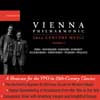Vienna Philharmonic Orchestra in 20th Century Music, Vol 1
A mixed bag, both in terms of music and performances, but a stimulating one
View record and artist detailsRecord and Artist Details
Composer or Director: Leoš Janáček, Arthur Honegger, Igor Stravinsky, Egon (Joseph) Wellesz, Anton Webern, Alban Berg, Arnold Schoenberg, Franz Schmidt
Genre:
Orchestral
Label: Andante
Magazine Review Date: 1/2004
Media Format: CD or Download
Media Runtime: 235
Mastering:
Mono
ADD
Catalogue Number: 4080

Tracks:
| Composition | Artist Credit |
|---|---|
| Symphony No. 5, 'Di tre re' |
Arthur Honegger, Composer
Arthur Honegger, Composer Ernest Ansermet, Conductor Vienna Philharmonic Orchestra |
| (The) Rite of Spring, '(Le) sacre du printemps' |
Igor Stravinsky, Composer
Igor Markevitch, Conductor Igor Stravinsky, Composer Vienna Philharmonic Orchestra |
| Sinfonietta |
Leoš Janáček, Composer
Leoš Janáček, Composer Rafael Kubelík, Conductor Vienna Philharmonic Orchestra |
| Passacaglia |
Anton Webern, Composer
Anton Webern, Composer Vienna Philharmonic Orchestra Zubin Mehta, Conductor |
| (6) Pieces |
Anton Webern, Composer
Anton Webern, Composer Vienna Philharmonic Orchestra Zubin Mehta, Conductor |
| (Der) Wein |
Alban Berg, Composer
Alban Berg, Composer Dorothy Dorow, Soprano Karl Böhm, Conductor Vienna Philharmonic Orchestra |
| Pelleas und Melisande |
Arnold Schoenberg, Composer
Arnold Schoenberg, Composer Karl Böhm, Conductor Vienna Philharmonic Orchestra |
| Symphony No. 2 |
Franz Schmidt, Composer
Erich Leinsdorf, Conductor Franz Schmidt, Composer Vienna Philharmonic Orchestra |
| Prosperos Beschwörungen |
Egon (Joseph) Wellesz, Composer
Bernard Haitink, Conductor Egon (Joseph) Wellesz, Composer Vienna Philharmonic Orchestra |
Author: Arnold Whittall
The first disc (all three are very well filled) begins with the newest music, a performance from December 1951 of Honegger’s Fifth Symphony, which had received its première in Boston in March that year, under Charles Munch. Honegger’s brand of rather dour earnestness is not exactly popular today, but this symphony has lighter moments, too, and Ansermet leads a confident, persuasive reading, with well-pointed rhythms, not in the least tentative. The Rite of Spring under Igor Markevitch is not tentative either. Indeed, this is one of those performances which comes across as if the score had been completed only a few weeks – or even a few days – earlier. The sound tends to the raucous, but you will go a long way to find a more dramatic account. It comes within a year of Markevitch’s 1951 studio version with the Philharmonia which Jonathan Swain deemed ‘a great Rite in the making’ (Testament, 6/97), and I’m inclined to say the same of this one.
The first disc is completed with an effervescent rendering of Janácek’s Sinfonietta under Rafael Kubelík from 1955. Any of his other recordings will probably be more polished than this, but I doubt if any will have more exuberance and warmth of character.
The rest of the album offers Viennese – or at any rate, Austrian – music, and on each disc two live concerts are involved. On June 1, 1969 Karl Böhm’s programme included Berg’s concert aria Der Wein (1929) and Schoenberg’s early tone-poem Pelleas und Melisande (1903). Neither was often heard at that time, and while the Berg just about passes muster the Schoenberg never really settles, the early stages laboured, the later pushed on relentlessly in what could be taken as a desperate attempt to get to the end as quickly as possible. In the circumstances the orchestra copes remarkably well, but with undistinguished radio sound this is not a performance to replace such well-regarded studio recordings as those by Karajan and Boulez. Zubin Mehta’s Webern, recorded during the 1983 centenary year, fares better, although Op 6 (even in its scaled down 1928 version) needs a more refined acoustic if its poetic details are to make their full impact.
The third disc contains two rarities. Franz Schmidt’s 48-minute Second Symphony (1911-12) echoes Bruckner and Mahler, and despite the pervading derivativeness, coupled with rather sprawling structures, Leinsdorf and the orchestra communicate a high degree of positive involvement. There are a few more personal ideas, especially in the finale, but the music seems consistently over-orchestrated in a recording that contrives to sound both recessed and strident. Debts to Mahler also surface in the ‘five symphonic studies’ after Shakespeare’s Tempest by Egon Wellesz, completed in 1935, three years before he left Austria for Oxford. Prospero’s Beschwörungen has some eloquent and appealing moments, especially in the yearning horn writing of the ‘Epilogue’, which depicts Ferdinand and Miranda. The portraits of Ariel and Caliban are rather less inspired, but the expert orchestra give a strong reading under Bernard Haitink, and the 1985 recording is a bit more spacious than that for the Schmidt symphony.
Discover the world's largest classical music catalogue with Presto Music.

Gramophone Digital Club
- Digital Edition
- Digital Archive
- Reviews Database
- Full website access
From £8.75 / month
Subscribe
Gramophone Full Club
- Print Edition
- Digital Edition
- Digital Archive
- Reviews Database
- Full website access
From £11.00 / month
Subscribe
If you are a library, university or other organisation that would be interested in an institutional subscription to Gramophone please click here for further information.





